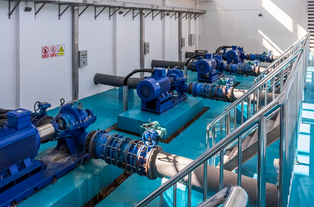Characteristics of water pumps when conveying viscous liquids
When a water pump is conveying viscous liquids, its characteristics will be affected by many factors, mainly including the viscosity of the liquid, the type of pump (such as centrifugal pumps, volumetric pumps, etc.), speed, and operating environment. The following is a detailed analysis of the characteristics of water pumps conveying viscous liquids:
1. The influence of liquid viscosity
Flow and head:
Generally speaking, as the viscosity of the liquid increases, the flow and head of the water pump will decrease. This is because high-viscosity liquids will increase the internal friction resistance of the pump, thereby reducing the hydraulic efficiency of the pump.
For centrifugal pumps, when the viscosity of the conveyed liquid increases, its flow-head curve will shift downward, that is, at the same head, the flow will decrease; or at the same flow, the head will decrease.
Efficiency:
When conveying high-viscosity liquids, the total efficiency of the water pump usually shows a downward trend. This is because the reduction in the mechanical efficiency and hydraulic efficiency of the pump caused by the increase in liquid viscosity is the main factor affecting the reduction in the total efficiency of the pump.
Especially when the speed is high, as the viscosity of the liquid increases, the total efficiency of the pump will decrease more. However, at low speeds, transporting high-viscosity liquids still has certain efficiency advantages over transporting clean water.
Power consumption:
Due to the need to overcome higher friction resistance, the power consumption of water pumps when transporting high-viscosity liquids usually increases. Therefore, when selecting a water pump, it is necessary to consider whether its power reserve is sufficient.

2. Influence of pump type
Centrifugal pump:
When a centrifugal pump transports high-viscosity liquids, its performance will be greatly affected due to the increased friction between the impeller and the liquid. Therefore, it is usually necessary to select a centrifugal pump with a special design (such as a centrifugal pump with adjustable blades) to adapt to the transportation of high-viscosity liquids.
Positive displacement pump:
Positive displacement pumps (such as screw pumps, gear pumps, etc.) have better performance when transporting high-viscosity liquids. This type of pump transports liquids through fixed volume changes, so it is not very sensitive to changes in the viscosity of the liquid. However, positive displacement pumps may be worn when transporting liquids containing solid particles or impurities.
3. Influence of speed
When transporting high-viscosity liquids, appropriately reducing the speed of the water pump can improve its efficiency. This is because low speed can reduce the friction loss and volume loss between the impeller and the liquid.
However, too low a speed may result in insufficient flow or insufficient head of the pump. Therefore, when selecting the speed, it is necessary to determine it according to the specific application scenario and transportation requirements.
4. Influence of operating environment
The operating environment of the water pump (such as temperature, pressure, medium, etc.) will also affect its performance in conveying viscous liquids. For example, a high temperature environment may reduce the viscosity of the liquid, while a high pressure environment may increase the risk of leakage of the pump.




